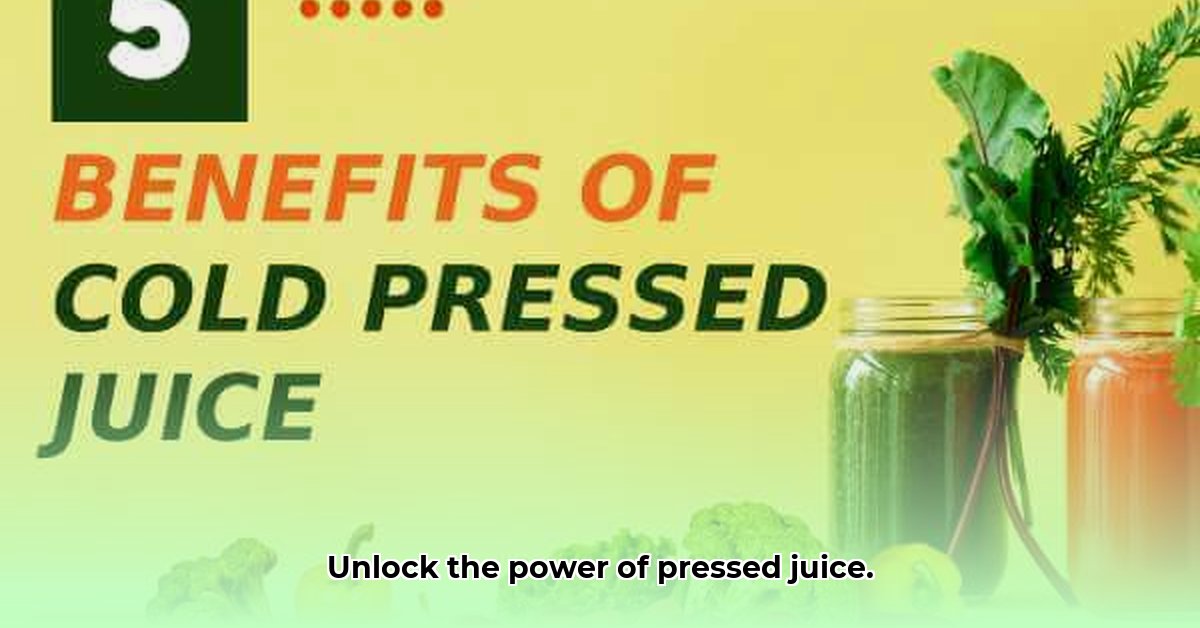
Cold-pressed juice has become a trendy health beverage, but does it live up to the hype? While not a magic bullet, cold-pressed juice offers superior nutritional benefits compared to other juicing methods, primarily due to its gentle extraction process. However, responsible consumption is crucial to reaping its advantages and avoiding potential drawbacks. This comprehensive guide unveils the science behind cold-pressed juice, its potential health benefits, and how to incorporate it into a balanced lifestyle.
What is Cold-Pressed Juice?
Unlike centrifugal juicers that rapidly spin fruits and vegetables, generating heat and potentially degrading nutrients, cold-pressed juicers use a slow, hydraulic press. This gentle process minimizes oxidation and heat exposure, preserving enzymes, vitamins, and minerals more effectively. Think of it like the difference between gently squeezing an orange versus pulverizing it—the gentle method retains far more of the fruit’s essence and nutrients.
[Insert image comparing cold-pressed and centrifugal juicing methods]
Nutritional Advantages: A Nutrient-Rich Beverage
Cold-pressed juices are nutritional powerhouses, delivering a concentrated dose of vitamins, minerals, and antioxidants. A typical 8-ounce serving of green juice could contain the equivalent of multiple servings of leafy greens, along with added benefits from other fruits and vegetables. However, the precise nutrient content varies greatly depending on the ingredients.
[Insert chart/infographic comparing nutrient content of cold-pressed vs. other juices]
For example, kale and spinach abundant in Vitamin C, celery provides potassium, and carrots are rich in beta-carotene. These nutrients play crucial roles in supporting immune function and overall well-being.
Health Benefits (with caveats): Potential Upsides
While not a cure-all, cold-pressed juice may offer several health benefits when integrated into a balanced lifestyle:
- Improved Digestion: The absence of fiber (removed during juicing) may aid digestion for some individuals. However, those with sensitive digestive systems should proceed with caution. Always consult your doctor for advice tailored to your specific dietary needs.
- Boosted Immunity: The high concentration of vitamins and antioxidants may support immune function. But remember, a robust immune system relies on factors beyond nutrition, such as sleep, stress management, and regular exercise.
- Weight Management Support: Substituting sugary drinks with cold-pressed juice could contribute to weight management as part of a comprehensive calorie-controlled diet and exercise program. However, it's vital to be mindful of the calorie and sugar content of the juice itself.
- Increased Energy Levels: The natural sugars and nutrients in cold-pressed juice can provide a sustained energy boost, in contrast to the rapid spike and crash often associated with processed sugary drinks.
Important Note: These potential benefits are most effective within a holistic health strategy prioritizing a balanced diet, regular exercise, and sufficient sleep.
Potential Drawbacks and Responsible Consumption: The Importance of Moderation
Cold-pressed juice, despite its benefits, presents some potential downsides. The high sugar and calorie content in many fruit-based juices is a primary concern. Therefore, mindful consumption is paramount.
Strategies for Responsible Consumption:
- Read Labels Carefully: Pay close attention to the sugar content and serving size listed on the label.
- Prioritize Vegetable-Based Juices: Vegetable juices tend to be lower in sugar than fruit-based options.
- Practice Portion Control: Adhere to the recommended serving size to manage calorie and sugar intake.
- Balance is Crucial: Cold-pressed juice is a complement to a healthy diet, not a replacement for whole foods.
Choosing and Storing Cold-Pressed Juice: Maximizing Freshness
Selecting high-quality juice and practicing proper storage ensures you reap the maximum health benefits.
Selection Tips:
- Choose Reputable Brands: Opt for brands that emphasize fresh, high-quality ingredients and transparent processing methods.
- Inspect Expiration Dates: Choose juices with an ample shelf life remaining and consume them promptly after purchase.
- Assess the Appearance and Aroma: Discard any juice that exhibits any signs of spoilage (off-putting smells or discoloration).
Storage Methods:
- Immediate Refrigeration: Refrigerate your juice as soon as it comes home.
- Airtight Containers: To extend shelf life, transfer the juice to airtight, opaque containers to minimize oxidation from light and air exposure.
- Freezing for Extended Storage: Freeze juice in ice cube trays for convenient portioning and longer-term storage.
Recipes and Ideas: Incorporating Cold-Pressed Juice into Your Diet
Cold-pressed juice can easily be integrated into your dietary routine.
- Morning Refresher: Start your day with a glass of green juice paired with a slice of whole-wheat toast.
- Healthy Snack: Enjoy a small glass of juice accompanied by a handful of almonds or other healthy nuts and seeds.
- Culinary Creativity: Use cold-pressed juice as an ingredient in smoothies or salad dressings for an added flavor boost.
Conclusion: A Healthier You, One Informed Choice at a Time
Cold-pressed juice offers significant nutritional advantages and potential health benefits, but responsible consumption is paramount. Remember, it's a valuable addition to a balanced lifestyle, not a substitute for whole foods and regular physical activity. By making informed choices and prioritizing a holistic approach to health, you can unlock the many potential benefits of cold-pressed juice while maintaining a well-rounded and balanced diet.